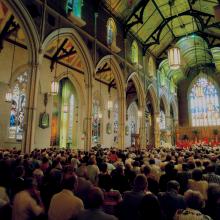teach

Image via Josef Hanus / Shutterstock.com
It’s hard to stand in front of a congregation and talk about domestic violence.
It’s hard, because you never really know the stories of the people sitting there.
Who might have experienced domestic violence in their lives, in their home growing up, in a relationship during high school, on a college campus, in the home where they now reside?
Who might have experienced it last night? Who might have been told by their mother or religious leader that they cannot leave an abusive marriage because they would be breaking their vows? Who might have struck out at a partner? Who might have let their needs for control overwhelm their sense of self-restraint? Who might want to mask their violence with a smile or generous donations?
It's hard to stand in front of a congregation and talk about domestic violence. But it’s essential.
It’s essential because too often in the past, religious traditions have been used to defend an abusive patriarchy, to bind victims to marriage commitments that are undermined by intimate violence, to encourage people to “offer up” suffering rather than change the conditions that cause it.
It’s essential because shining a light of the reality of domestic violence is a critical step in creating pathways to safety for those who are victims. It’s essential because speaking out about domestic violence as a violation of God’s love can give victims strength to seek a better way. It’s essential because naming domestic violence as evil can help call perpetrators to account – and perhaps to repentance and treatment.
Years ago on a bright Tuesday in March, I was driving to seminary and I found myself stuck in traffic on I-25. Sitting in a dead stop on the interstate I stared up into the clear blue Colorado sky and thought, “What in the world am I doing? I don’t believe a word of this Jesus stuff. I mean, It’s a fairy tale.”
But then in the very next moment I thought, “Except…throughout my life…I have experienced it to be true.”
I experience the gospel to be true even when I can’t believe it. And honestly sometimes I believe the gospel even when I don’t experience it. And I suggest to you today that this is why we have and even why we need Word and Sacrament. Because see, we are a forgetful people.
And it is to this office of Word and Sacrament that you have been called Matthew and I feel like in an ordination sermon, the preacher should in some way address the level of preparedness of the ordinand in question, and I am in a position to do just that.
